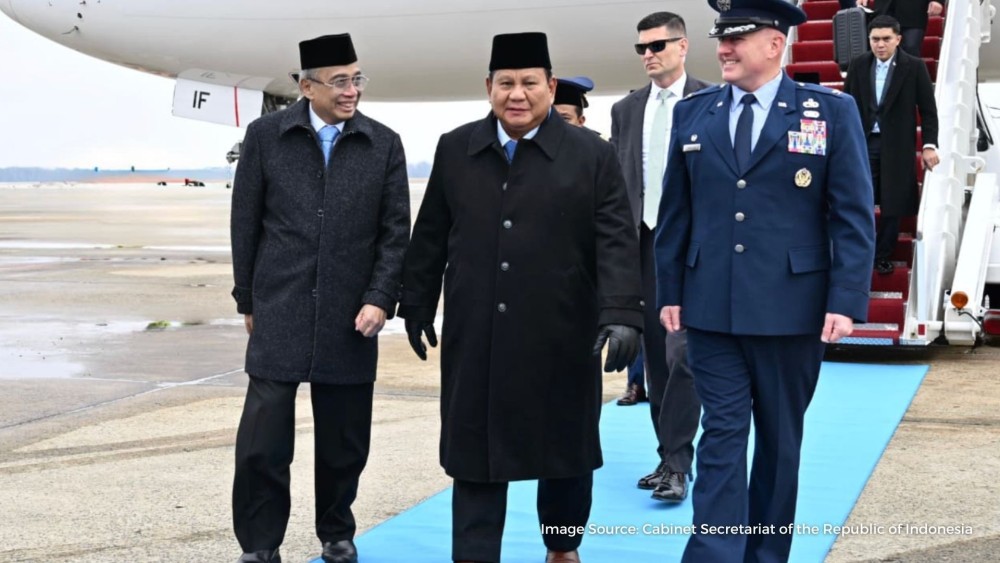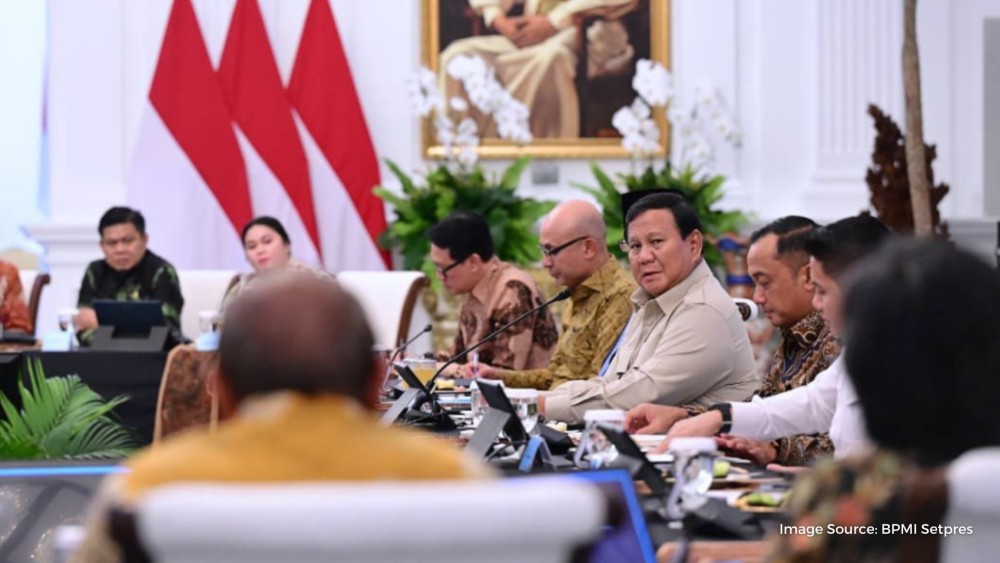This Week’s Headlines (Feb. 10 – 16 , 2024)
16 Feb 2024

Indonesia expects to see foreign inflows following Prabowo’s one-round win
Indonesia is expected to see a surge of capital inflows in the coming months after Defense Minister Prabowo Subianto took a strong lead in the preliminary results of the presidential race, as investors perceive the outcome as continuity of the current government, which is deemed good for business.
Prabowo is set to succeed President Joko “Jokowi” Widodo after securing nearly 60 percent of the vote, according to several quick counts conducted by credible pollsters. With Jokowi’s eldest son Gibran Rakabuming Raka as his running mate, the pair’s lead is regarded as too big to challenge, analysts say.
The Indonesia Stock Market (IDX) Composite index reacted to the news positively, rising to 7,303 at closing time on Thursday, 1.3 percent higher than Tuesday’s close.
According to data from trading app Stockbit, the IDX booked Rp 2.73 trillion (US$174.9 million) of foreign net buys a day after the election.
Experts said the stock market rally showed that there was a positive influence from the election quick count results, as investors feel certainty about the policies that will be adopted by the new president.
“However, we need to be wary of potential lawsuits from losing candidates, which may disturb investors’ confidence in the short term, similar to our experience after the 2019 election,” said Isfhan Helmy, head of institutional research at the local brokerage Sinarmas Sekuritas, who spoke to The Jakarta Post on Thursday.
Almost five years ago, Prabowo, who lost against Jokowi, decided to challenge election outcome in the Constitutional Court, which was followed by days of violent demonstrations by his supporters. Isfhan said he expected a surge of capital inflow in coming months that will also help stabilize the rupiah exchange rate against the United States dollar, predicting a dollar will buy between Rp 15,500 and Rp 15,900.
State-owned Bank Mandiri and private lender Bank Danamon also see the potential for significant foreign inflows into Indonesian stocks and bonds, as well as in the form of foreign direct investment (FDI).
“With a sustainable trade surplus and low inflation, the rupiah should have room to appreciate beyond its current level,” said Bank Danamon economist Irman Faiz in a statement. Irman forecast the rupiah could strengthen further to Rp 14,901 per US dollar throughout the year. The rupiah stood at Rp 15,606 to the greenback, according to Bank Indonesia data, on Thursday.
M. Adityo Nugroho, an analyst at Mirae Asset Sekuritas, explained that foreign investors have been aggressive in accumulating stocks of Indonesian firms, especially big banks.
Between Jan. 26 and voting day on Feb. 14, foreign investors booked Rp 10.3 trillion in net buys at the IDX.
“We may see a significant capital inflow in the next two weeks. However, there is also a possibility that those investors have become comfortable [with their current investment levels],” Adityo told the Post on Thursday.
Sectoral gains
Experts also forecast that stocks in certain publicly listed firms related to Prabowo’s campaign promises, such as infrastructure construction and free lunches, as well as firms owned by parties related to him, may enjoy a tailwind this year.
Erwan Teguh, head of research at state-run local brokerage BNI Sekuritas, said that historically infrastructure, property and basic industrial sectors performed better than the IDX Composite index after the 2014 and 2019 elections, as President Jokowi had a pro-infrastructure policy.
“Thus, stocks in the infrastructure and construction sector will experience a surge in value this year, as well as stocks in certain consumer firms, which are related to the program of the elected president [like free lunches],” Erwan explained to the Post on Thursday.
Mirae Asset’s Adityo also said the cement and construction sector would get a boost, as Prabowo would continue Jokowi’s infrastructure push, including the future capital city of Nusantara in East Kalimantan.
State-owned construction firm PT PP and its subsidiary PP Presisi, as well as Wijaya Karya’s subsidiary WIKA Beton and Adhi Karya saw their stock prices surge more than 20 percent a day after the election, according to the IDX.
Dairy firms too will benefit from positive sentiment as a result of Prabowo’s proposed free milk program for students, he said.
Isfhan from Sinarmas Sekuritas opined that the IDX Composite would remain largely driven by the banking sector in the future, but others like pharmaceutical and hospital stocks may be lifted up given Prabowo’s planned healthcare programs.
“The renewable energy sector could also be an investment alternative, as the new government will accelerate programs to hit its net-zero target,” he stated.
Meanwhile, Reliance Sekuritas’ investment consultant Reza Priyambada said some investors may look into investing in stocks with ties to Prabowo and Gibran campaign teams or related parties, as they would benefit from the pair’s victory.
These include coalminer Adaro Energy, Mahaka media group, energy conglomerate TBS Energi Utama and many others.
“However, we need to pay attention to how much the influence of the new president could affect their fundamental performance in the future,” Reza said in a statement, suggesting investors remain cautious about their actual financial performances.
Source: The Jakarta Post
Indonesia Sustains Trade Surplus for 45 Consecutive Months Despite Export Decline
Indonesia's trade balance has maintained a surplus for 45 consecutive months. In January 2024, the surplus reached US$2.02 billion, despite facing a notable decline in exports.
According to Amalia Adininggar Widyasanti, Acting Head of The Central Statistics Agency (BPS), compared to December 2023, there was a contraction in the trade balance of 38.6 percent. In comparison to January 2023, the trade balance experienced a contraction of $1.87 billion or 48.2 percent.
"Indonesia's trade balance has posted a surplus for 45 consecutive months since May 2020," said Amalia during a press conference at the BPS office in Jakarta on Thursday.
The BPS recorded that the export value reached $20.52 billion, a decrease of 8.34 percent from December 2023. Compared to the same period the previous year, there was a contraction of 8.06 percent. The monthly and annual decrease in export value was mainly contributed by the decline in the export value of the processing and mining sectors.
The surplus in January 2024 was supported by a non-oil and gas commodity surplus of $3.32 billion. The main contributors to the surplus were mineral fuels, vegetable fats, and oils, as well as iron and steel.
Meanwhile, the trade balance for oil and gas commodities recorded a deficit of $1.30 billion in January 2024. The deficit in the trade balance for oil and gas was driven by a decrease in the export value of oil, with a contribution to the decline of 0.89 percent.
Looking at trade partner countries, the three largest contributors to the surplus were India with $1.38 billion, the United States with $1.21 billion, and the Philippines with a surplus of $0.63 billion.
At the same time, Indonesia also experienced a trade balance deficit with three major trading partner countries, namely China with a deficit of $1.38 billion, Australia with a deficit of $0.43 billion, and Thailand with a deficit of $0.42 billion.
"The deepest deficit with China is driven by machinery and mechanical equipment and parts, electrical machinery and equipment and parts, as well as plastics and plastic goods," said Amalia.
Source: Jakarta Globe
Indonesia targets higher rice output to combat soaring prices
Agriculture Minister Andi Amran Sulaiman pledged on Tuesday to step up the rate of rice production in Indonesia in an effort to address the increase in prices of the staple food.
"We will boost the production, as we are aware that an increase in production is critical to suppressing the prices of rice," he said after a meeting with President Joko Widodo in Jakarta.
He noted that Indonesia is not the only country experiencing significant increases in rice prices, calling the price spike a global phenomenon.
Sulaiman reported that since December last year, the government has been successful in encouraging farmers to plant rice on around 4 million hectares, with each hectare expected to produce 5–8 tons.
From December 2023 to January 2024, 3.2 million hectares were planted with rice, and an additional 1–1.5 million hectares were planted this month.
"We are currently expediting planting activities in major rice-producing regions on Java Island and beyond. In Java, we are focusing on Central Java, East Java, and West Java," he pointed out.
As for regions outside Java, the government has placed focus on the provinces of Lampung, South Sumatra, North Sumatra, South Sulawesi, and West Nusa Tenggara, he added.
He expressed hope that the planting acceleration efforts would help the government achieve the target of producing 3 million tons of rice, actualizing the estimates from Statistics Indonesia.
The National Food Agency (Bapanas) earlier reported that the price of medium-grade rice rose by 0.43 percent to Rp13,890 (US$0.88) per kg. Premium-grade rice saw a similar increase of 0.32 percent, currently priced at Rp15,800 (US$1.01) per kg.
Source: Antara News








